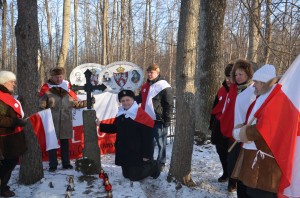- January 21, 2014
- 449
„Don’t let die the casualties” The Pilgrim of Insurgents’ trail 1863-1864

In the love calendar Both Nations’ Homeland, patriotic spirits sing, in January, “Gloria victis” – “In praise of the winners”, for heroic forest people who fought in January Revolt 1863-1864.
The year of festivities to celebrate 150 anniversary of the outbreak and duration of Polish and Lithuanian insurgents’ wrestle is not over yet. There are many months ahead to remember them, we are going to worship, go to their graves and pay tribute to them through praying songs. And in this way, the will of Zbigniew Herbert, the poet, is lived up to “Don’t let die the casualties”. Hearts full of love for perfect insurgents “In the name of God, for our and your freedom” are not afraid of hard frosts. They courageously go to Lithuanian trail to reach the forest and find the collective grave of the insurgents from 1863, who belonged to the troop of Gen. Zygmunt Sierakowski “Dołęga”.
The rally of 9 people, as always for Vilnius pilgrims, near Ostra Brama, to ask Mother of Mercy for grace for the aim. None of patriotic pilgrims was afraid of the cold morning
(-17.C), 18th January, and they all are about 80s. The willing of being there, where the youths of Vilnius scout group of Maryja Pani Ostrobramskiej arrived every year, made exceptional people unforgettable memories.
In the sunny, cold day, we reach the surrundings of Panevėžys. We leave the main road and turn right. We’re near Ginietynė, the village where the victorious battle took place. 2 500 people fought in the battle and they all belonged to troop of Zygmunt Sierakowski and they defeated Russiand in 21st April 1863. The large stone with the memory board in Lithuanian, which is dedicated to the commander, recalls the event. Z. Sierakuaskasowi was the head of the military group from Kauno voivodeship. A few kilometers further, we find ourselves in the thick forest and we see the beautiful grave from XIX century – eternal cross and the fence. In front of it, there is the wooden obelisk from 1863. The great emotion appears on the faces of the people because they are here for the first time and they have the opportunity to light the candles on the insurgents’ graves. We sing also the Christmas carol “Today in Bethlehem…”, and the silence of the snowed forest answered us “Christ is born He’s going to deliver us…”
During the trip to Podbrzezie kiejdańskie, the place where Lithuanian insurgents are buried, with Antoni Mackiewicz, the priest, to head, we visited the basilica in Krekenava, where there is the painting of Virgin Mary. It is here where the great poet, Maironis, the prelate, translated Polish songs into Lithuanian. Time spent in Paberžės was import ant to us, as there are objects that remind the event that took place 150 years ago. It means the rally of insurgents and the departure to fight with Muscovites: the church and the churchyard, the roadside shrines and the graves, the houses and the river, the park and the museum of the revolt from 1863 in Lithuania near it. It is a great “encyclopaedia” on desires of Both Nations’ Homeland, the strong bond connected with an ideology and the fights, which is presented in the museum. And we all would like to hear Polish-Lithuanian discussions here every year. The meeting of historians and politics and the ceremonies of Polish and Lithuanian bishops could take place here and we want the God to make the peace for the new generations because „In the silence of the night a voice radiates… Stand up, shepherds, God is born for you!…”.
And we stopped to pray for a while and we paid tribute to 75 insurgents who died in Šventybrastis. And we went to church in Vandžiogala and lit the candles for the insurgents and for the Miłosz, the Górski, the Wilkiewicz and the Chmielewski. We are grateful to Ryszrad Jankowski, the chairman of ZPL group from Kauono region, for the meeting and for getting a warm reception in The House of Polish Culture in Vandžiogala. Next day, on 19th January, the scouts of WHM went to Vandžiogala. They went to insurgent route Lauda in order not to “let the casualties die in our memory and our hearts”.
Tłumaczenie by Anna Kwiatkowska w ramach praktyk w Europejskiej Fundacji Praw Człowieka, www.efhr.eu. Translated by Anna Kwiatkowska within the framework of a traineeship programme of the European Foundation of Human Rights, www.efhr.eu.

